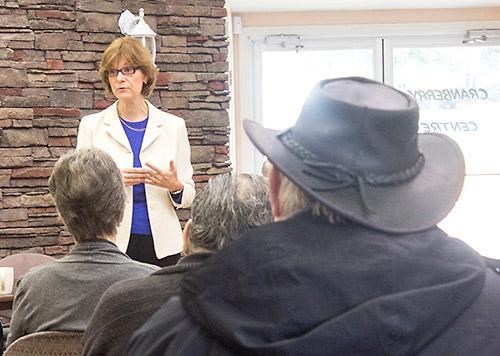Isobel Mackenzie, BC’s seniors advocate, visited Powell River on her trip around the province to hear what is and what is not working for seniors.
Mackenzie talked about what being the seniors advocate entails and about her work collecting public concerns around housing and transportation.
She explained on Monday, January 19, to the group of more that 50 people gathered at the Cranberry Seniors’ Centre, that her role is to provide government with “thoughtful recommendations that include a blueprint of how to fix problems.
“I don’t have the power to force the government to make the changes, that’s part of your job, the citizenry,” Mackenzie said. However, government would not have created the position if it did not want to look at making policy changes, she added. “Besides, those policy makers are going to be seniors soon.”
Seniors at her presentation asked a wide range of questions and provided anecdotes about their experiences and those of their parents.
Mackenzie’s first report with recommendations will be provided to the government in April, she said. Though it has yet to be completed, Mackenzie suggested that one recommendation she will make will be around the definitions and criteria for seniors to be admitted to publicly subsidized residential care and assisted living facilities. She suggested that 10 to 15 per cent of BC seniors in residential care would be better suited for assisted living, but “we have been boxed in by the rules,” she said.
Additionally, she said that she will be recommending the province provide more funding for assisted living across BC and more residential care beds in more rural and remote communities, like Powell River or the northeast of the province. Powell River has between 200 to 250 beds for residential care in both public and private facilities, as well as about 40 in assisted living, said Marlene Hall, a participant at the forum.
“We should be able to provide what [seniors] want,” Mackenzie said, explaining that in her 20 years of working in home support in Victoria she saw many people resist the idea of going into residential facility care because of the loss of autonomy. Assisted living facilities may prove to be more appropriate for some because they provide only two meals a day and allow seniors “a little more space of their own,” and the ability to keep their pets, she said.
“We’ve got to have a mix of facilities, some that take pets and some that don’t,” she said. “Pets are really important and for some seniors they are the ‘person’ in their life.”
She explained that there is quite a difference in experience between those seniors living in urban centres in the province compared to those in more rural settings. Mackenzie said she is constantly surprised that she does not hear more complaints from seniors living in rural communities about the need to have to travel to the city for medical procedures.
In response to a question around increased income thresholds for medical services plan (MSP) premium support, Mackenzie said she sees the MSP as a “regressive poll-tax” and thinks that seniors, and most lower income British Columbians, would be better served by government reworking the way it collects money to pay for health care. BC is the last province in Canada to use this system, but changing it to a system based on progressive income levels “represents a giant paradigm shift,” she said.
For more information about the office of the seniors advocate, readers can visit www.seniorsadvocatebc.ca or contact Mackenzie toll-free at 1.877.952.3181.



